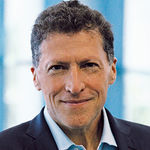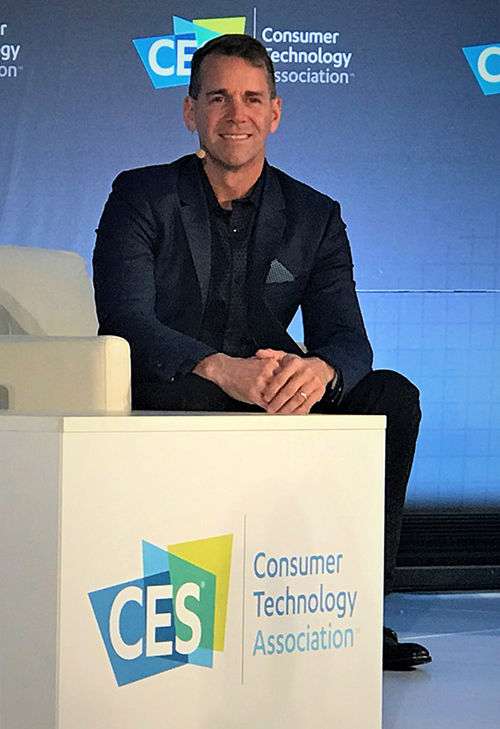
Arnie Weissmann
"The cruise industry is an insular industry which talks to itself, markets to itself and awards itself."
That criticism came not from an industry outsider but from John Padgett, Carnival Corp.'s chief experience and innovation officer. He made the comment fresh from participating in "Technology's Innovators and Disrupters," a panel at CES, the gargantuan consumer electronics show held earlier this month in Las Vegas.
During the panel, he had declared that innovation "is the most overused word," and that it's limiting to think about it only in connection to technology. Innovation, he asserted, naturally occurs when one focuses on a goal and does whatever it takes to reach that goal.
In a lounge near the hall where the panel took place, he made the statement about cruising being insular to help frame a discussion about his -- and Carnival's -- goals, which led to the Ocean Medallion project and other new directions.
The tendency of insularity leads the industry to think small, he told me, adding that Carnival CEO Arnold Donald's mission is, in part, "to show [that Carnival] is the player in the industry that can participate on the world stage."

John Padgett, chief experience and innovation officer for Carnival Corporation, on the panel “Technology’s Innovators and Disruptors” at CES in Las Vegas earlier this month. Photo Credit: TW Photo by Arnie Weissmann
The question is not, he said, can Carnival fight for market share with others in cruising, but can it compete with the whole set of global industries wrangling for share of consumers' time? That's the macro goal that spurs innovation for Carnival, he said, and a key to getting consumers' time is to give more of it back to them.
Time is the focus that has defined Padgett's career. At Disney, he came up with Disney Magical Express to get guests from the airport to Disney properties faster, the Magic Band to get them into the park (and enable transactions) more quickly and FastPass Plus to get them onto rides faster. All moved his employer toward the goal of giving guests more time to "maximize their vacations."
Similarly, the multidimensional Ocean Medallion, which can eliminate the need to stand in line to get a drink or fumble for a key to get into a stateroom, "takes friction out so guests can consume more and, in theory, stage a vacation that is more valuable."
Padgett said he believes that time plus personalization plus positive interactions with staff is the winning formula. "It creates a relationship and durability of intent to return." All else, including destinations, the ships and onboard features, are secondary, if not outright distractions.
"We still [put focus on] the features of a new ship," he said. "But I don't think consumers understand the differences between new and old ships, or conceptualize the size of ships. But that's what the industry gets caught up in. Everyone talks experience, but what's marketed is product comparison and features.
"It's incumbent upon us to break the paradigm of destination focus," he continued. "We promote, for instance, that we stop at bucket-list destinations. You're telling a person to do something before they die, but no one thinks they're dying tomorrow, so they have plenty of time to get there. We should talk about opening the immensity of the world."
It's even limiting a cruise line's potential to talk about the product as being a cruise. Carnival's cross-brand focus on the word "ocean" is very intentional, he said. "We leverage ocean vacations. Everyone loves oceans. Not everyone loves to cruise."
And Carnival has assets beyond the ships, he pointed out. "We have two trains and lodges in Alaska."
The example of Alaska, he believes, underscores an unmet challenge to the cruise industry. Cruise lines, he said, "take hundreds of thousands of people to Alaska. That's a real animal kingdom. At the same time, Disney attracts tens of millions. One's fanciful, one's real. How can selling the real thing at a lower price be delivering [so many fewer customers]? Stories about the 'real' need to be told that rival the 'fanciful.'"
Returning again to Disney's approach, he said it believes in vacation planning cycles. You'll get intent to return every X number of years, as long as you provide consistency and don't disappoint.
"Cruise can do the exact same thing," Padgett said. "We can say the world is at your disposal, and we take out the hassle and eliminate frustrations. The experience is meaningful. It connects you to people, and you'll have a great time. But can we communicate that?"
One effort Carnival is making in that regard is via TV shows such as "Ocean Treks," "The Voyager," "Vacation Creation," "Good Spirits," "Go" and "Local Eyes."
"Anything you see [on these shows] is accessible," he said.
Coming full circle, the TV shows, improved internet service fleetwide and the Ocean Medallion platform could all be seen as innovations, but Padgett said they are essentially tactics in the larger strategies of enhancing the cruise industry in the eyes of the world and staging guest experiences in ways that increase a vacation's value through better use of time.
"As soon as you make that leap, it changes your perspective on what to focus on," he said. "It's not just, 'I have this technology; I have this app.' Rather, it's finding what's the best opportunity to crack the market and stop it from cycling the same way it has year after year after year."
Has Carnival succeeded in that yet? "We're at a crossroads," Padgett said.